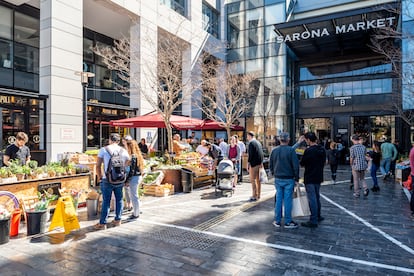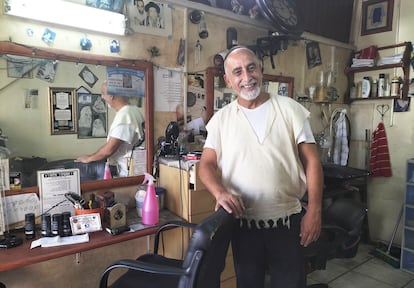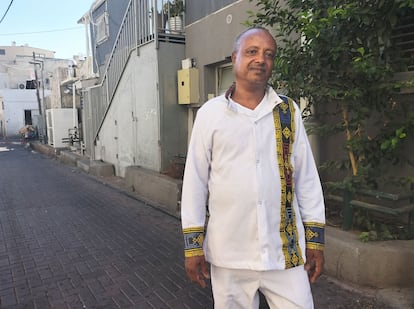Tel Aviv: The other face of the most expensive city in the world
Prices are skyrocketing in the Israeli city, especially when it comes to housing. An apartment already costs an average of €1 million. Some 44% of Israelis will cast their votes in November with an eye to policies around the cost of living

Two years ago, Savion Raz moved from northern Israel to the most expensive neighborhood in the most expensive city in the world, Tel Aviv. She rents an apartment with her partner in one of the 11 towers that make up Park Tsameret, a kind of luxury oasis that once attracted model Bar Refaeli and diamond magnate Beny Steinmetz. She pays 15,000 shekels (about $4,365) for four rooms. “It is one of the cheap ones. Others reach 60,000 shekels,” she says. She and her partner earn three times what they pay in rent. “We live here because we can afford it. We are not millionaires, but we are not middle class either,” she admits, almost blushing while walking her dog. “In Tel Aviv, in any case, everything is much more expensive.”
Five kilometers south, a sign advertises haircuts for about €7 in a tiny barbershop decorated with stickers from Shas, the ultra-Orthodox Sephardic party. “I lowered the price during the coronavirus, and I have not dared to touch it. Here it is difficult for people to make ends meet, and if I raised it again it would be noticed,” explains the owner. Sasson Mizrahi, who has spent 30 of his 56 years of life in the area, says that in 2018 he paid €582 for rent. Now he pays €1,455. When asked how he can afford the rent hike with reduced prices, he replies: “God help me, everything depends on him.”

The neighborhood is called Hatikva Quarter, the Hebrew word for hope. It harbors just the opposite. In its small houses, some of which appear abandoned, live a mix of immigrants, Mizrahi Jews originally from the Middle East and North Africa who settled there decades ago, and young couples fleeing gentrification. It is one of the poorest areas of a city in which about 42,400 inhabitants, 10% of its population, have at least $1 million in investible assets, according to a report released last Tuesday by the consulting firm Henley & Partners, based in London. In the Middle East, only Dubai has more millionaires than Tel Aviv.
The World Cost of Living Index published by The Economist Intelligence Unit, a subsidiary of the British weekly The Economist, declared Tel Aviv the most expensive city in the world for the first time last year, after surpassing Hong Kong, Paris, Zurich, Singapore and Osaka. The scale compares the prices of goods and services in 173 cities, which, in Tel Aviv, registered a 3.5% increase in 2021, the largest rise in five years.
In an ordinary supermarket, a yogurt goes for at least $1 and a kilo of rice for $3. A small sea bream starts at around $20. In restaurants, the cheapest glass of wine is rarely less than $10. The average price of an apartment already exceeds $1.1 million, and transportation costs rose by 21% in 2021.
Tel Aviv’s spot on the list is misleading, however, because the index is calculated in dollars, and the shekel is very strong. This crushes the pockets of expatriates who earn in foreign currency or tourists who change money upon arrival, but the average Israeli does not notice it on a day-to-day basis.
“It is an incorrect calculation,” emphasizes the president of the Taub Center for Social Policy Studies in Israel, Avi Weiss, in a telephone conversation. “There is no doubt that Israel is an expensive country, for reasons of lack of competition, and it does not help that it is a small country. But Tel Aviv is not the most expensive city in the world,” he adds, before noting that the north and south of Israel’s economic heartland are “two different cities.”
An expensive and unequal country
Analysts tend to agree that Israel, with 9.5 million inhabitants, is so expensive because some sectors function as oligopolies, due to protectionist policies inherited from the country’s socialist origins which make imports difficult and increase prices. The liberalization that began in the 1980s concentrated resources in the hands of a few families. National producers today hardly have reasons to compete via price or quality.
It is also one of the most unequal developed economies, due to the gap between the standard of living that separates, at one end, the inhabitants of the coastal strip north of Tel Aviv – where investment in the high-tech sector and funds from the Jewish diaspora are concentrated – and, on the other hand, Palestinians with Israeli citizenship (a fifth of the population, treated as second-class citizens) and ultra-Orthodox Jews. The latter are poorly integrated into the labor market and make up almost 13% of the population. According to the 2022 report from the Global Inequality Laboratory at the Paris School of Economics, the richest 10% in Israel earn 19 times more than the bottom 50%. There are levels of inequality similar to those of the United States.
Tel Aviv was the center of the largest social protest in the country’s history. In 2011, a young Israeli girl fed up with rent prices, Dafni Lif, camped out on Rothschild Boulevard and set up a Facebook group. The initiative caught on, with massive demonstrations and a massive encampment for “social justice” inspired by the Spanish anti-austerity movement known as 15-M, which had taken place shortly before. The then-Israeli prime minister, Benjamin Netanyahu, managed to defuse the demonstration with announcements of reforms and the creation of a committee whose key recommendations were never carried out. Last June, there was an attempt to reissue it in various parts of the country, but it did not come to fruition.
According to a survey released last month, 44% of Israelis will decide how to cast their vote at the upcoming November 1 election (the fifth in the three years) based on a given party’s plan to reduce the rising cost of living. Inflation, which reached 4.6% in August, is more controlled than in Europe and the US, although July saw the largest increase in decades (5.2%). Housing costs continue to be the biggest headache: they have risen 17.9% in one year.
Back at Park Tsameret, Noy Sivan Cohen, a 34-year-old mother, runs a flower shop at the entrance to the mall. She makes “little more” than the $2,000 she and her partner pay to rent a four-bedroom house in the town of Herzliya, about 10 kilometers away. She is aware that she lives better than most of her fellow citizens, but still does not have enough money to move to Tel Aviv, where she would be closer to her work.

“It is not easy to live here. I live, but I can’t save. If I allow myself any trip, it is to Sinai,” she says, referring to the neighboring and much cheaper Egyptian peninsula popular with Israelis. “Lately, I have the feeling that in the supermarket I select basic things, such as sugar, milk and vegetables, and I end up paying $145 without understanding how. And that’s not even mentioning restaurant prices,” she laments, standing in front of an optician that offers glasses for the equivalent of $3,000 and next to a convenience store that sells roast beef with mustard sauce and cream for $100.
In both Park Tsameret and Hatikva, the real estate signs are in English. The former area caters to Jews from other countries who have capital and want to emigrate or own property in Israel. The latter is targeted at migrants from Eritrea, the Philippines, Sudan, Sri Lanka or Colombia, who usually cannot read Hebrew. They are “100% of the clients” of a tiny real estate agency on the main avenue, owned by David (he prefers to omit his last name). The smallest house, at 20 square meters, rents for €785, and the largest, at 50 square meters, is priced at about €1,454. He admits that he charges them more than the Israelis because they do not have a guarantor to back them up, but they accept it: they end up paying less by sharing the house among a good number of people.
One of those tenants is 50-year-old Futuwi Habtemichael. He explains without a hint of complaint that he works in construction 12 hours a day, with only one day off each week. “I’m very happy. Each hour is €11.5. And I am not in Eritrea, where there is only conflict and they would give me a ridiculous amount for this,” he says as some roosters cross the street. “If Tel Aviv is so expensive, it is because there is money here.”

Tu suscripción se está usando en otro dispositivo
¿Quieres añadir otro usuario a tu suscripción?
Si continúas leyendo en este dispositivo, no se podrá leer en el otro.
FlechaTu suscripción se está usando en otro dispositivo y solo puedes acceder a EL PAÍS desde un dispositivo a la vez.
Si quieres compartir tu cuenta, cambia tu suscripción a la modalidad Premium, así podrás añadir otro usuario. Cada uno accederá con su propia cuenta de email, lo que os permitirá personalizar vuestra experiencia en EL PAÍS.
¿Tienes una suscripción de empresa? Accede aquí para contratar más cuentas.
En el caso de no saber quién está usando tu cuenta, te recomendamos cambiar tu contraseña aquí.
Si decides continuar compartiendo tu cuenta, este mensaje se mostrará en tu dispositivo y en el de la otra persona que está usando tu cuenta de forma indefinida, afectando a tu experiencia de lectura. Puedes consultar aquí los términos y condiciones de la suscripción digital.









































